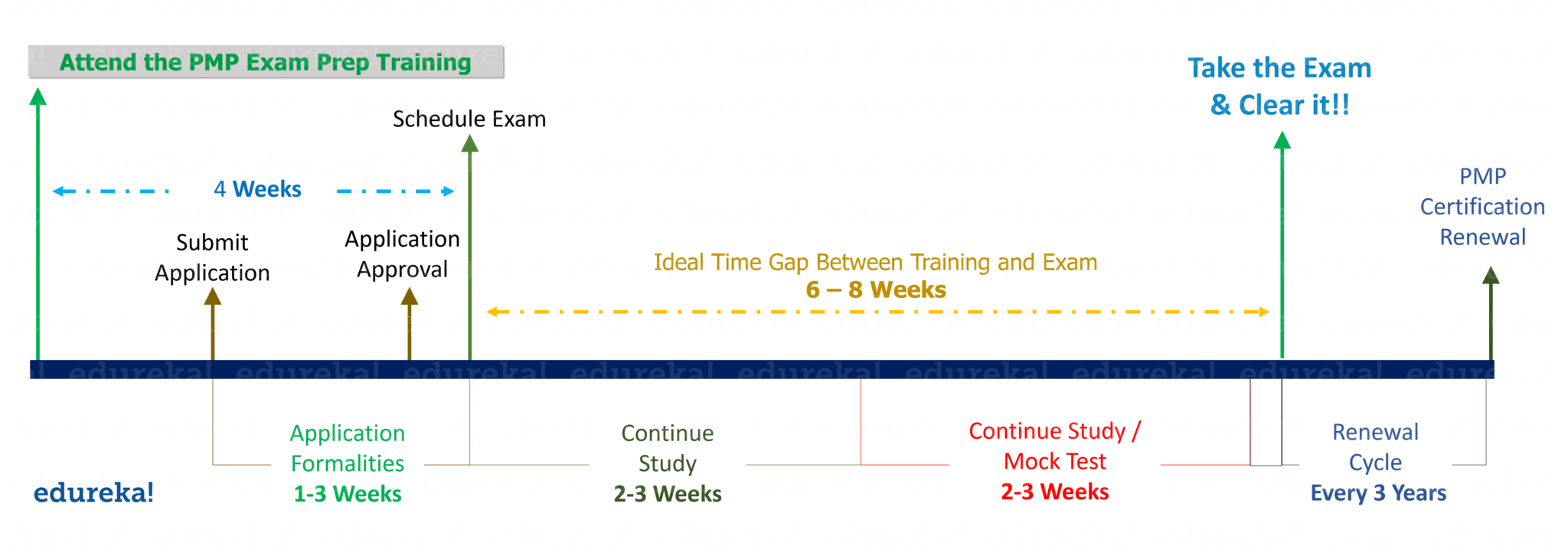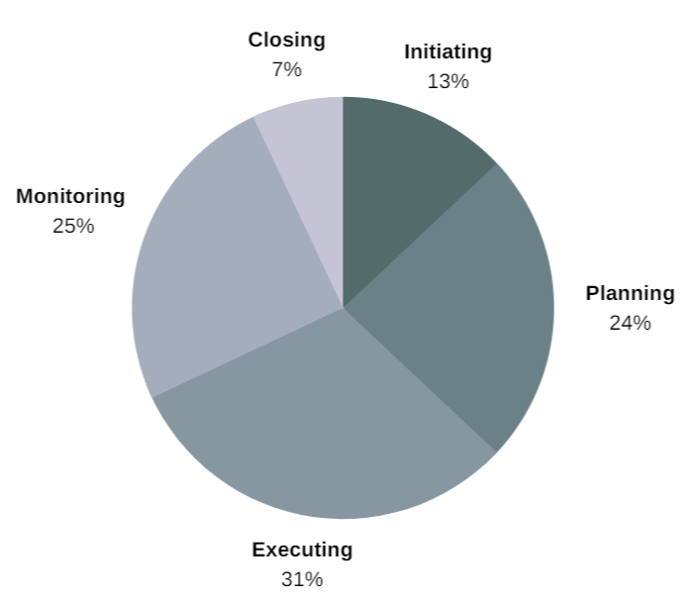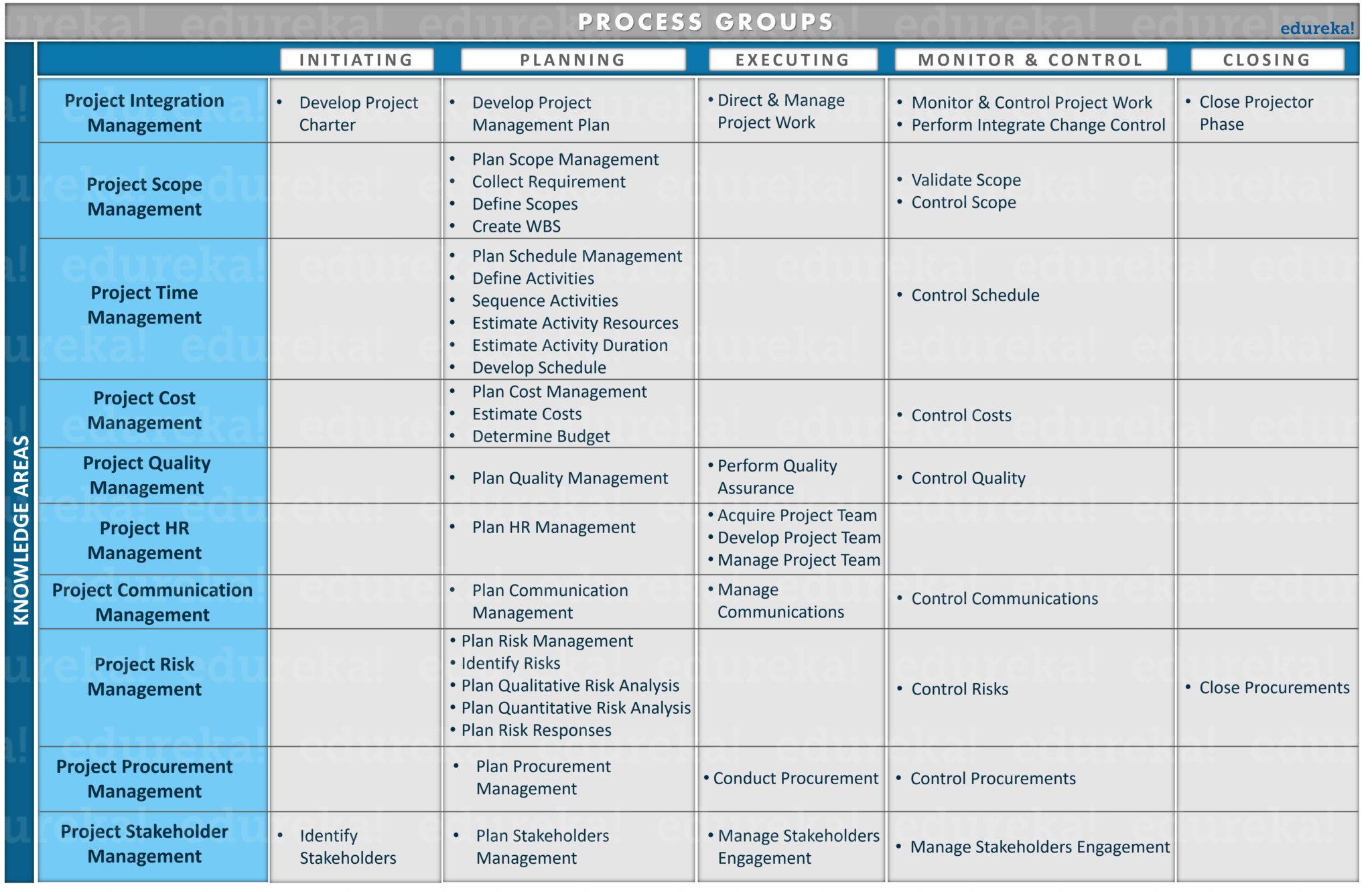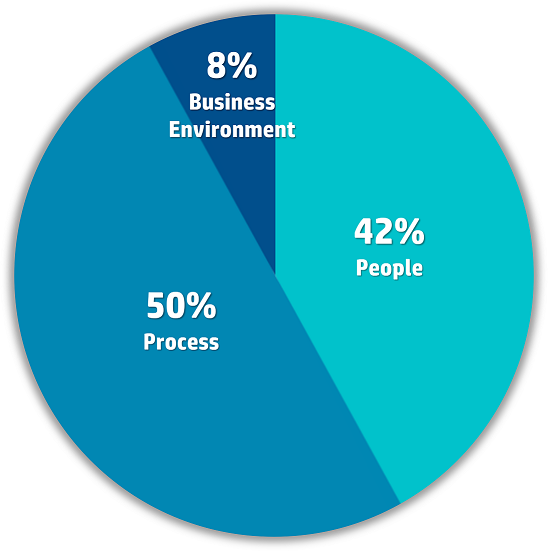What is the best way to study for the PMP® exam?
Well, to be honest, PMP® exam preparation is not like “One size fits all”. What I mean is, it will all depend on the time and effort you put into it along with the dedication.
So, after a long term of research and observation, it was concluded that it takes approx 6-8 weeks of time for a working professional to prepare for the exam.
Below is the diagrammatic representation of the estimated timeline.
Let me elaborate on this timeline for you.
Before you apply for the PMP® certification exam, it is advised to take up a training course.
These training courses are excellent for helping you understand the various parameters and requirements of different types of projects.
Along with this, many of them will also help you in gaining the required number of PDU‘s (Professional Development Units) that are mandatory for the exam.
In case you are looking for a structured training approach then there are quite a few reputed organizations that provide online training.
One of them is Edureka. It is one of the fastest growing online training providers with the most effective learning system in the world.
Here, you will be guided by PMP® Certified Trainers, who have years of experience in training.
These online courses are generally, 4 weeks long and will help you in gaining a stronghold on Project management fundamentals.
While undergoing the training, you can apply for the PMP® exam application form. You can generate your PMI credentials on pmi.org.
I would recommend you to go for offline mode of form fillup. This way you will get enough time to pay attention to each and every section of the application before submitting it.
Once your application is approved, the next step is scheduling the exam. It will be wise to schedule the exam after an interval of 6-8 weeks.
This will give you enough time to study various process groups, Knowledge Areas, processes involved, etc. Also, you can take up various full mock exams to enhance your speed and boost your confidence.
I think after going through all of this, you can easily clear the exam at the first attempt itself.
Before I switch to the next topic, let me make one thing very clear. PMP Certification is nothing like any other professional certification, which will be valid for a lifetime.
Rather, it’s more like a journey of professional project management, where you reach the first milestone by clearing the exam and receiving the PMP® certificate.
The next milestone will be redeeming the certificate after every three-year.
I think, if you can follow the above schedule, you can definitely bag the PMP® certificate at the first attempt itself.
Now, let’s move on to the next topic of this PMP® exam prep blog.
PMP® Exam Syllabus

Since you already know the estimated time you have, let me now discuss the exam syllabus and the areas you need to focus on.
The syllabus for PMP® certification is based on PMBOK (Project Management Body Of Knowledge)® Guide. The latest edition of PMBOK® Guide was released in March 2018 i.e., the 6th Edition.
According to the PMBOK® Guide, the PMP® exam syllabus is built surrounding various process groups and knowledge areas.
Below diagram shows the breakdown of the syllabus:
As you can see from the diagram, the Planning, Executing and Monitoring phases together covers more than 80% of the syllabus.
These phases are further categorized into various tasks/processes mapped into various Knowledge Areas.
The following table represents the exact mapping of processes:

Project Management and Methodologies Training
I hope by now you have a fair idea, about how extensive this syllabus is and why it is suggested to take up a training program.
But one thing you must note here is that this exam pattern will remain valid until June 2025.
In the next section of this article, I will brief you on what is changing in the PMP exam.
How is the PMP Exam changing in 2020?
From 1st July 2020 onwards the pattern of PMP examination is changing.
The new PMP exam syllabus will be based on three domains which are namely:
- People
- Process
- Business Environment

The project management practitioners at the current date need to work in a variety of Project environments while making use of various approaches.
But the current exam pattern is not able to incorporate all these. This is the major reason, why PMI® has decided to update the exam pattern to make it capable of reflecting as well as incorporating various approaches across the value delivery spectrum.
According to the new PMP examination pattern, 50% of the exam syllabus will cover the predictive project management approaches while the rest 50% will cover Agile or Hybrid approaches.
Thus we can conclude that the three approaches which are predictive, agile, and hybrid, will be represented throughout the above mentioned three-domain areas without isolating any particular domain or task.
But in case you are thinking that with the lesser number of domains PMP examination will become easier, then you are utterly wrong!
According to the official statements released by PMI®, PMP Certification exam will become even harder to crack.
So a word of advice, if you are thinking of getting PMP® Certified, do it before July 2025
In case you are wondering where you can acquire the required PDU’s or Contact Hours then you can go ahead and check with Edureka’s Reasons to Get PMP Certified.
Now that you know, what all you need to prepare, let us see how to optimize this process and maximize the output with minimum effort.
How to Prepare for PMP® Exam?
Do you know, why people fail to clear this exam in their first attempt, despite having years of experience in project management?
Well, its because they assume that their experience will serve the same purpose as studying the PMBOK® Guide; which is a wrong notion.
So, stay away from such false assumptions and instead meticulously study the entire PMBOK® Guide.
It is the best source of learning and identifying the fundamental aspects of project management like ITTO (Inputs, Tools, Techniques & Outputs).
Now how to optimize your time? Since you have a limited number of days, you have to make most out of them.
Below I have created a 30-day schedule, in which you can thoroughly finish your PMP® exam prep:
| Domain | Syllabus Percentage | Estimated Time Required |
| Initiating | 13% | 4 days |
| Planning | 24% | 7 days |
| Executing | 21% | 9 days |
| Monitor & Control | 25% | 8 days |
| Closing | 7% | 2 days |
Once you are done with PMBOK Guide, you will still have 2-3 weeks left for your exam.
During, this phase, it is strongly recommended to take repeated mock tests. Unless and until you start scoring 80% of marks consistently, I won’t suggest you to appear for the certification exam.
I hope by now you have a clear path sketched in your mind for PMP® exam prep.
I know PMP® exam prep is a prolonged process and these tips and tricks below will help you keep going. Further in-depth knowledge can be got from the PMP Certification Course.
Tips & Tricks to clear PMP Exam
Let me start with the first tip:
Take up a PMP® Certification training course
It will help you in earning the required number of PDU’s mandatory for the PMP® Certification Exam. Moreover, you will be able to achieve the PMP® certification with total efficiency by combining quality with your needs.
Build an ideal study ambiance around yourself
Being a working professional it becomes a tough task to study along with your job. Thus, you need to stay dedicated and squeeze out time to study as much as possible and try to avoid any kind of distractions.
Design a study schedule and adhere to it
To prepare better you must build up a schedule with all the subjects that you need to study. If possible, try and cover two different subjects per day. Along with studying, take notes and ask queries. Try to be punctual to your schedule but remember not to overdo it.
Always stay updated and connected to the PMP community
You can make use of forums/ groups on facebook, twitter or LinkedIn to connect with other PMP® exam aspirants. Interacting with people will help you to find out what is happening and stay updated with the latest news regarding PMP® Certification. Also, you can check out the latest blogs on PMP® written by certified people.
Appear for PMP® simulators as much as possible
As I have already mentioned, try to appear for as many simulators as you can. It will help you to train your brain for quick processing even under pressure. Take notes after each simulator to have a clear idea of the areas you need to improve.
Always analyze the wrong answers and clear all your doubts
Check out the common certification questions and answers asked in previous PMP® exams. Read through all the questions and answers while attempting the simulators. Also, try to gain a thorough knowledge of a subject, it will increase your chances of finding the right alternatives.
Consider Your PMP® Preparation As A Project
Finally, I would suggest you to consider this PMP® Exam prep as a project. Set your deadline and stick to your schedule. It will give you more time to practice all the concepts that you have learned and organized in your study plan.
This brings us to the end of this blog on the PMP® exam prep.
Hope this gave you a better picture of the journey you are going to embark on. One thing I would like to mention here is, passing the PMP® exam solely depends on your determination and the hard work you put into it.
So, if you are preparing for this exam, make up your mind and put your heart and soul into it and success will follow. Wishing you all the best for your exam and happy learning.
In case you are looking for online training, check out the PMP Training in India by Edureka, a trusted online learning company with a network of more than 250,000 satisfied learners spread across the globe.
Got a question for us? Please mention it in the comments section and we will get back to you.







Comments
Post a Comment